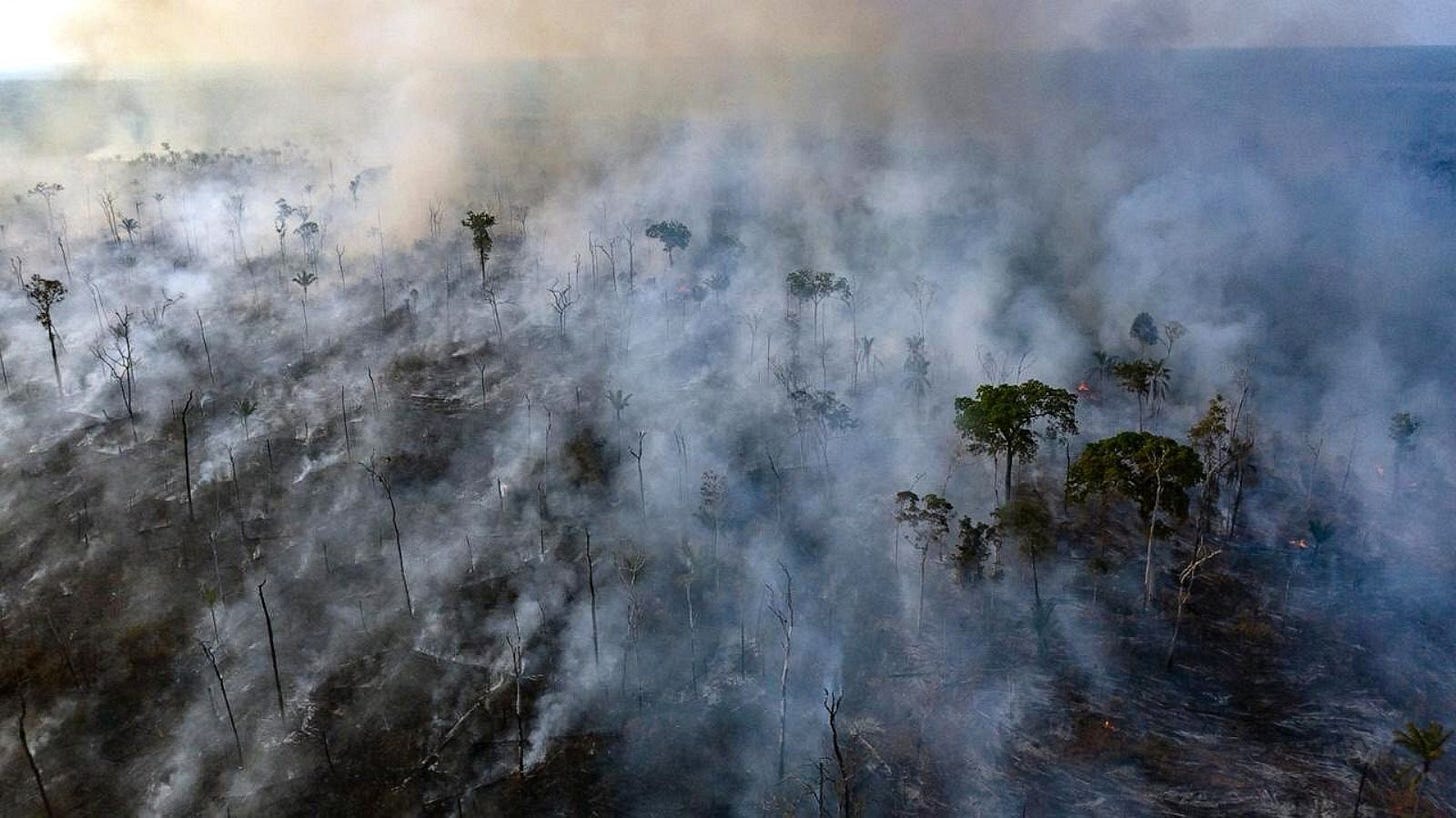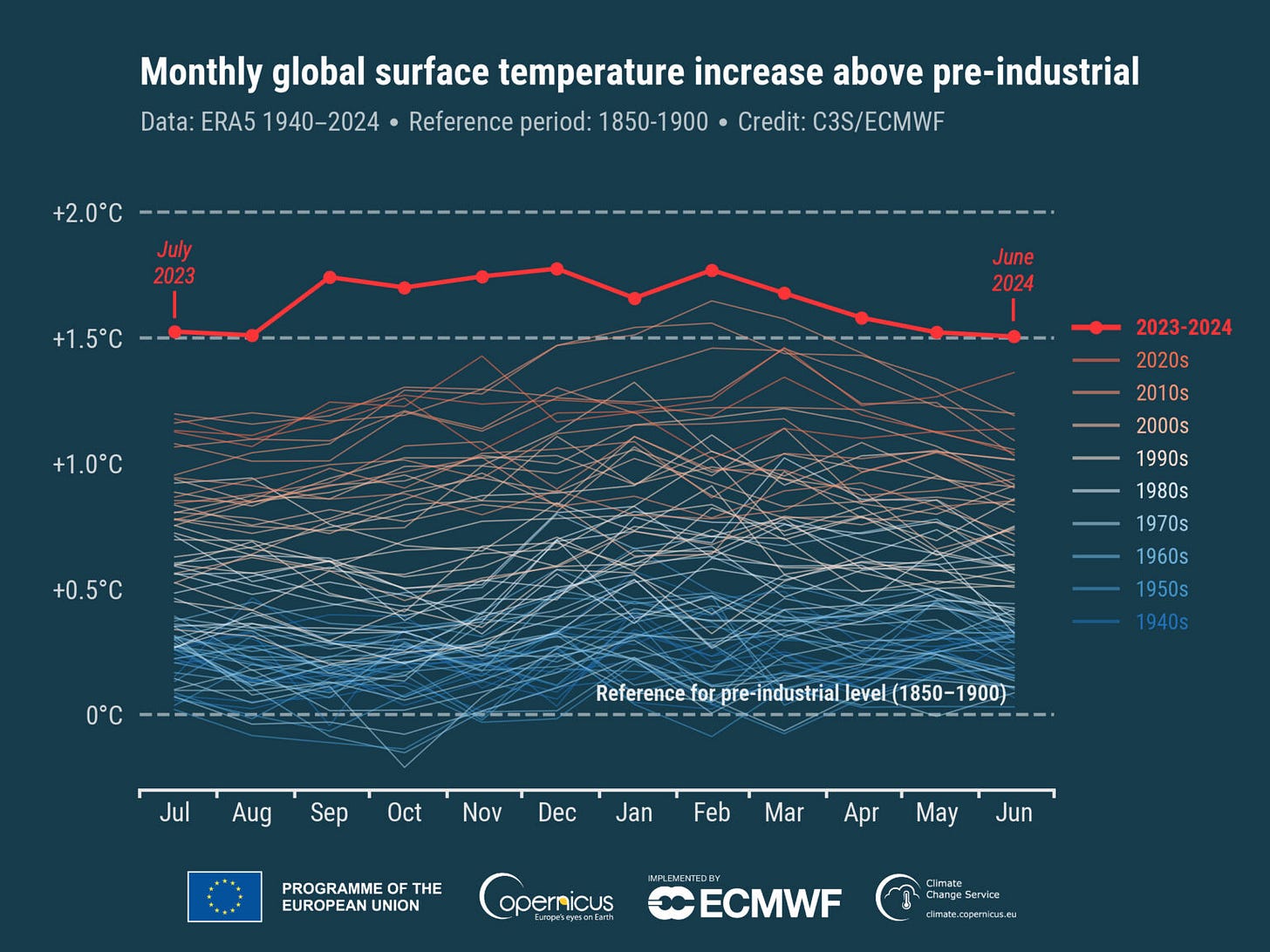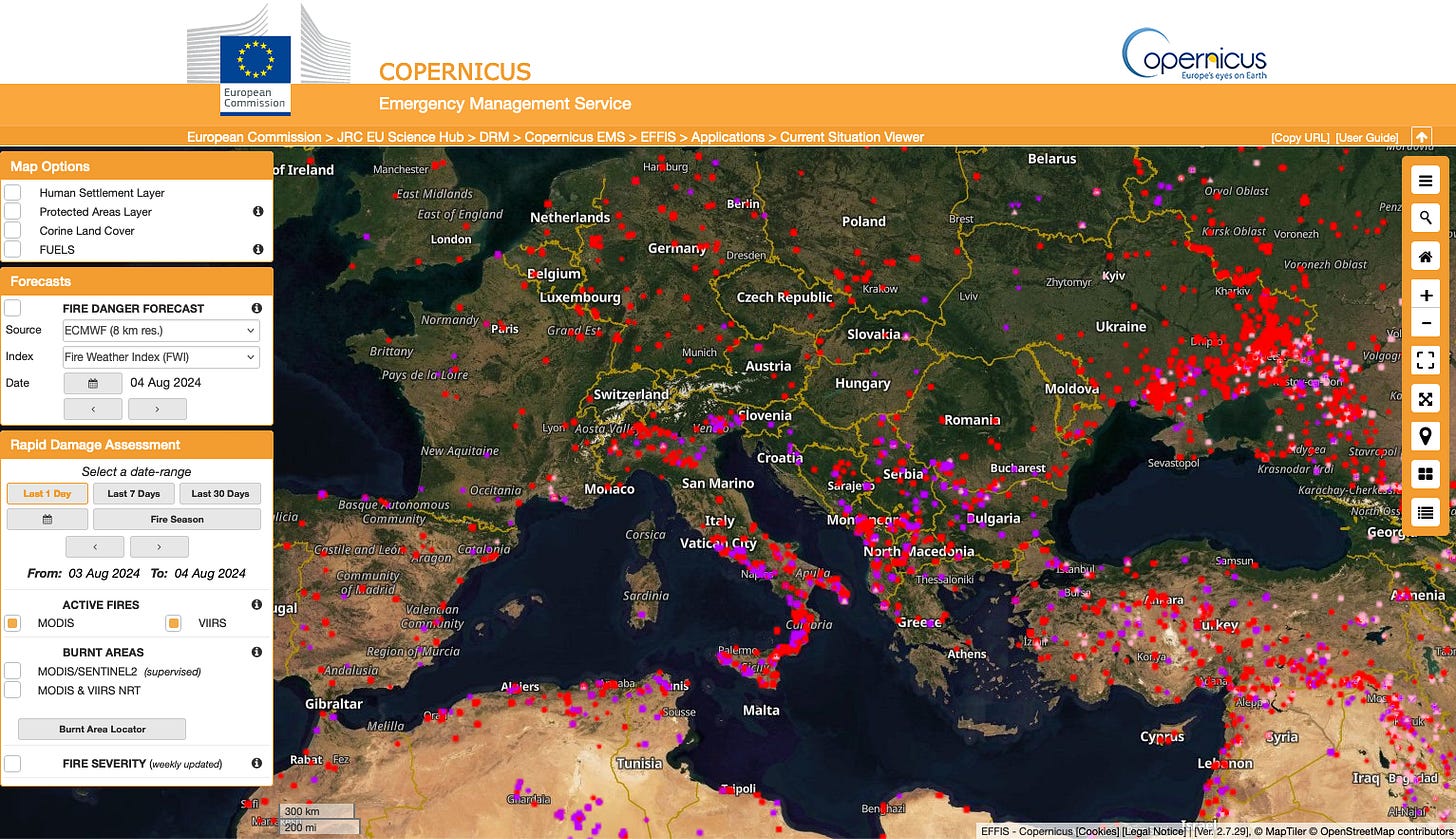No Fury Like a Planet Scorned
Fires are burning up our attempts to reduce carbon in the atmosphere

It is likely this post is too large for email from picture content. Please read online or in the app if this is the case, and thank you for reading my work.
Late last month, the scientific journal Nature Ecology & Evolution published a study of 21 years of satellite data revealing that the frequency of extreme wildfires equal to or greater than the 99.99th percentile has more than doubled from 2003 to 2023. Equally troubling, in the last seven years, six of the most extreme events recorded occurred.
Titled, Increasing frequency and intensity of the most extreme wildfires on Earth, the paper states it has been “widely” reported that area burned globally has decreased this century. In three years of researching and writing about the worsening climate emergency, I have not seen these reports, so I question use of the word widely. However, apparently that decrease is attributed to a decline in low-intensity fires in African grasslands and savannas.
More concerning is the fact that extreme wildfires have doubled, by a factor of 2.2 to be exact. Canada’s 45.7 million acres (18.5 million hectares) burned by the end of October last year, and Australia’s Black Summer of 2019-2020 with over 46 million acres (18.6 million hectares) are terrifying examples. Extreme fire disasters like these continue to occur in the Amazon Rainforest, as well as Chile, Portugal, Indonesia, Siberia and the Western United States.

The land area burned in those Canadian and Australian fires are about equivalent to the state of Missouri, or alternately the country of Tunisia sandwiched between Algeria and Libya. Libya is where climate change fueled super storm Daniel swept much of the town of Derna out to sea last year. Estimates of casualties are still muddled, ranging from 5,900 to 20,000 people. The water reached four stories on apartment buildings.

The 2023 Canadian fires emitted 3.28 billion tons (2.98 billion metric) of CO2 into the atmosphere, almost four times that of global aviation for the year. The Black Summer fires produced nearly twice the CO2 as Australia’s annual fossil fuel consumption, and tropical forest loss in Brazil and Columbia produced 2.4 gigatons of CO2 emissions in 2023. That’s about half of the annual fossil fuel emissions of the US.
How much is a metric gigaton? One billion metric tons. An American ton and metric ton are reasonably similar, 2,000 pounds vs. a little over 2,200.
I find the ecological, economic and psychological damage from such events is nearly incomprehensible. I have a friend from my writing who survived the Black Summer, but lost everything. Perhaps she can describe it. Guest post, Margi?
Wildlife loss statistics in Canada from 2023 seem to be as hazy as the smoke I inhaled in my dining room office, as my neighbors to the north were forced to evacuate by the hundreds of thousands. Annie Langlois, a biologist for the Canadian Wildlife Federation, lamented in an article on Phys.org, “We don't have a precise idea of the number of animals that died, but it's hundreds of thousands.”
So many numbers are so big these days.
I could be wrong, but Ms. Langlois’ guess seems light to me in face of the estimates for the wildlife loss of the Australian Black Summer. The figures are astonishing and heartbreaking. Estimates indicate that nearly three billion animals died. The figure includes 143 million mammals, 2.46 billion reptiles, 180 million birds and 51 million frogs. It’s thought that entire species of plants and animals were extinguished from the Earth forever.
So if you think the world is burning more than ever, you’re right. Homo sapiens have never seen this.
Another study of three decades of meteorological data published in the journal Nature Communications and reported by NASA in 2015, nine long and mostly wasted years ago, confirms fire seasons have lengthened and conditions have become more conducive to ignition and spreading. This is because the last nine years have been the hottest ever recorded since modern record keeping began in 1880. Furthermore, the planet’s single day average temperature record was broken on Monday, July 22 at 62.87° F (17.15° C). That broke the record set just the day before, and the European Union’s Copernicus Climate Change Service found the past twelve months exceeded 1.6° C (2.9° F). The IPCC’s urgently recommended limit above preindustrial temperatures is 1.5° C (2.6° F). Why are we not in panic mode?

As of July 29, there were ninety-five large active wildfires in the US that have engulfed 2.18 million acres (882,257 hectares) the most in Oregon, followed by California and Arizona according to the National Interagency Fire Center. Nearly 28,000 firefighters and support personnel are battling these blazes, and twenty-seven of them are Type 1, the largest, most complex and dangerous.
About one million acres (404,685 hectares) have burned this summer in the US Pacific Northwest and Canada has suffered more than 3,700 fires burning more than 5.12 million acres (2.07 million hectares) so far this year, according to Canada’s National Wildland Fire Situation Report, issued by the government Wednesday.

Fire season is about a month longer globally. In spite of burning more fossil fuels than ever before, we’re not experiencing the scale of last year’s brutality so far. That’s just sheer luck. Tinder conditions are growing ever higher, and although we may not be setting some of the records of recent past years, there are life changing devastating fires burning as I write.
Before I touch on some current fires, let’s look at Brazil last year, where the majority of the world’s critical rainforests and incredibly diverse species live.
Brazil’s disastrous winter

In 2023, 26.4 million acres (10.68 million hectares) of Brazil’s Amazon Forest succumbed to flames, 35.4 percent more than 2022. That amount of acreage is nearly equivalent to the state of Ohio, which occupies 28.7 million of acres. That’s one of the reasons I quit eating beef over a decade ago, as slashing and burning rainforest for cattle is a primary driver of Amazon fires, destroys indigenous people’s cultures, and egregiously punishes those who live a sustainable way of life. It’s also devastating one of the most beautiful and biodiverse habitats on the planet, the home to 40,000 kinds of plants, 427 kinds of mammals, 1,300 kinds of birds, 378 kinds of reptiles, over 400 kinds of amphibians, and around 3,000 types of freshwater fish. In 2020 alone, fires took the lives of 17 million animals and the devastation continues. In Brazil’s Pantanal this year, the world’s largest wetland, from January to July, 1.8 million acres burned (728.43 thousand hectares) a 1,500 percent increase from the same period last year. Agriculture, livestock, and mining are among the causes.
The Park Fire in California
The largest fire in the US as I write is the Park fire in northern California, which now stands at 427,000 acres (172,800 hectares burned). Starting in late July by a lunatic pushing a burning car into a canyon, it advanced at 4,000 to 5,000 acres an hour initially, quickly encompassing an area larger than the size of Los Angeles at 321,000 acres. 542 structures have been destroyed, evacuations prompted, and a state of emergency declared. At this point, it’s the 4th largest fire in California history. A month ago, with fire season just officially getting under way, officials said wildfires have burned five times the average area this year.
The Jasper Fire in Canada

This year’s special for Canada so far is the Jasper Fire, which has destroyed a third of the town’s structures and consumed 89,000 acres (36,000 hectares) of land as of July 26. A small town of just 5,000, Jasper hosts 2.5 million tourists a year. Maybe not anymore. Flames reached 328 feet (100 meters). Jasper National Park is the largest in Canada's Rocky Mountains and a UNESCO World Heritage Site. In total, 51 wildfires this year have forced 25,000 Albertans to flee their homes.
Jasper and it’s scorched park are located in the province of Alberta, governed by Premier Danielle Smith, a fierce proponent of Alberta’s tar sand oil and pipeline construction industry. I’ve called Ms. Smith out before. She teared up when speaking to reporters of the devastation. I wonder what she has learned, if anything? Are government officials who support fossil fuels worse than unhinged people who push burning cars into canyons? There is just no excuse at this late date.
Southern Europe
As you can see, everything is marvelous in Southern Europe. As usual, news from Africa was either scant in information or unavailable because I’m told it’s mostly full of black people. It’s truly despicable that western media mostly ignores the world's second-largest and second-most populous continent, after Asia.
Russia and final thoughts
Forest area destroyed by wildfires in Russia measured in hectares

NASA’s MODIS website describes Russia’s 2024 wildfire season as:
“…off to an exceptionally fierce start, with a thick blanket of smoke stretching across much of the Far East by early July.”
I concur. The graphic above came from The Moscow Times, reporting that 12.35 million acres (5 million hectares) have been destroyed in the Sakha Republic this year.
The heat melting permafrost in Siberia, the Arctic in general, and Greenland ice sheet are life and death issues. I am fearful this region which holds millions of years of carbon matter and methane may have tipped or is exceedingly close. I wrote about it in Permafrost? Maybe Not.
Siberia emitted 58 million tons of carbon in 2020. We cannot afford to lose our massive Arctic carbon sink or that of the teetering Amazon Rainforest. Many of us feel a flicker of hope after so many recent dark years in the Harris/Walz ticket. Let’s get them elected, push hard, and demand real solutions to this existential crisis. It’s not the future. We’re living it.
Let’s demand President Harris put scientists and environmental activists in her cabinet, not greedy Wall Street CEOs. Let’s demand rapidly moving to a low consumption, circular economy. Fact: we’re moving to a lower energy world. Oil is finite and dwindling. Peak oil was only extended by fracking. Now fracking is getting more difficult, with less and less energy recovered for more energy put in on ever longer drilling runs. This means that sometime in the next couple of decades it will become economically unviable to get oil out of the ground, costing more energy than can be recovered, so let’s bite the bullet now instead of finishing ourselves off with greenhouse gases.
This calls for a new vision, a new plan, not based on the infinite consumption on a finite planet. That plan has existed for decades, it’s called degrowth. I wrote about it in Degrowth: The Vision We Must Demand. This is an important and under publicized concept. It demands political courage and as much public support as we can organize to create that courage. The economy is going to degrow one way or another because oil is going to tap out. The entire world economy runs on oil. We have a massive, forced transition on our hands, one in which more doesn’t solve the problem, less does. It’s unlike anything humans have solved in the past.
Why are we waiting? The climate change effects of existing CO2 in our atmosphere already threaten us and will linger for hundreds of years to come. We can’t afford anymore. These are facts. We need to address reality. Now.








What a remarkable piece. Wildfire is a difficult thing to communicate. The sheer scale, intensity, and the layers of its damage eclipse most people's understanding. The ‘event’ passes and the climate impact becomes lost in the smoke.
Unless the story of wildfire is delivered by a gifted communicator. That's what you have delivered … wildfire unmasked with a clear and insightful call to action.
Margi said it all. Thank you, Geoff, for helping us understand the enormity of the problem.
My sister lives in Utah, and normally has a wonderful view of the mountains. She told me a week ago that she has not been able to see them for quite a while, because of the "haze". (She does not believe in climate change. There are none so blind as those who will not see.... or who watch FOX news.) It is almost impossible to change someone's mind and see the problem, when they are fed daily with misinformation.
I agree with you about the importance of the election. If we don't have people in leadership positions at all levels who dare to speak the truth, things will deteriorate much faster. We need the best-qualified, most knowledgeable people available to make decisions. An administration led by Democrats is the only realistic choice we have to make that a possibility.